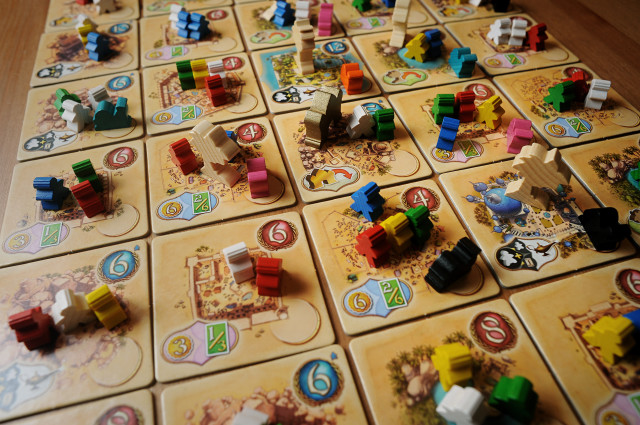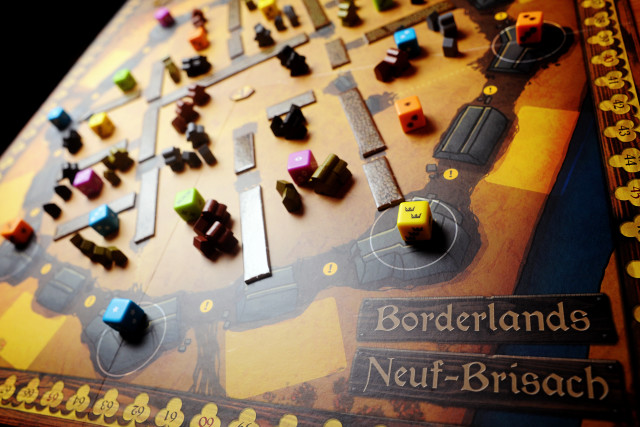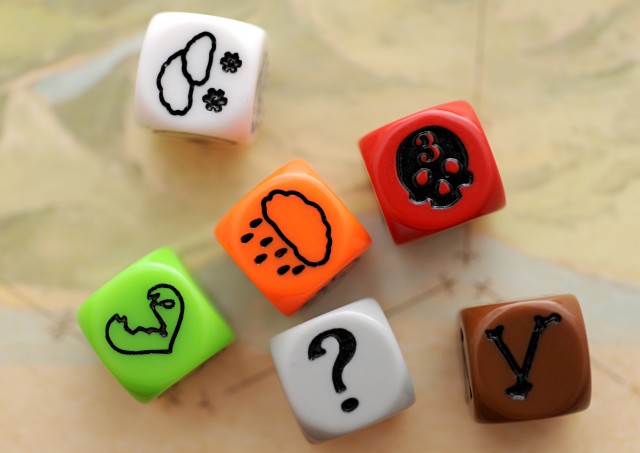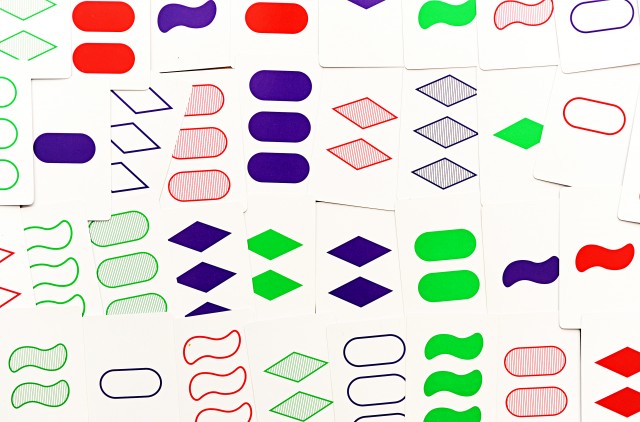I love board games, as much for the social aspect as the mental challenge they present, sometimes even more. My sweet spot is games that last 60-90 minutes, with some interesting decisions and a little bit of luck or chaos thrown in. Every once in a while I’ll get the itch to play something a little more meaty, something that will stretch my thinking muscles, the type of game that limits conversations and requires laser-like focus. I usually enjoy that experience even if I don’t do that well at them.
Here are five games that make me think in interesting ways. They take me out of my gaming comfort zone and that’s a good thing to do every once in a while.
Five Tribes
When I think of Bruno Cathala, I think of games that are medium weight and accessible by players of all skill levels. That assessment is true for the great majority of his deigns. The rules of Five Tribes are actually not that complicated, but considering all the options you have on a turn can blow your mind. Five Tribes uses a

Manacala mechanic, where you pick up all the tribe members of a certain type from one of the 25 locations making up the board. You’re then going to be laying them out one at a time on connecting spaces until you run out. You must end your turn on a space containing at least one of the tribe members you’re moving that turn. Then you perform the action associated with that type of tribesman. It’s not that any particular move is so complicated in this game, it’s that there are so many permutations to consider with each move you make. The path you leave behind might create a super sweet move for the next player, or there might have been another better play right under your nose. Further complicating things is the fact that the board will look dramatically different after each player’s turn, so it’s often impossible to really plan what you’re going to do in advance.
Unfortunately, in my experience more choices can lead a lot of players to sit and analyze what their best move is (if only there was a term for that). I just don’t have the patience for that kind of move optimization and so I just accept that I’m not going to be great at the game. I still enjoy the occasional game of Five Tribes, but I never really feel like I have a cohesive strategy. Maybe it says more about my gaming style, that I’m not willing to put in the time to find the best move, but more often then not I feel like I just picking up meeples and putting them down again.
The Walled City
The Walled City, by Daryl Andrews and Stephen Sauer is full of complex, interesting decisions. It’s an area control game that forces you to think on a number of different levels at the same time. The double sided city board starts relatively empty with a few walls to make up some of the outside fortifications.
In the first round of the game you will lay out roads, peasants and nobles (citizens). The roads will create the different neighbourhoods that

you hope to control with your peasants and nobles. Also scattered throughout the city are different coloured faction dice that you hope to influence and control. The more control you have of an area the more votes (points) you can get. The more control you have over a faction the more votes you can get as well. At the end of the first round there is a scoring and then the focus shifts.
In the second round you’re working on building walls to keep your citizens in the city and promoting your nobles to a watchman looking over the wall to gain you valuable votes. The sections of town without a wall built by the end of the game will lose all the nobles as they flee for safer cities. At the end of the game it is the person who has been able to garner the most votes who is declared the winner.
There is so much going on in the Walled City that it can be tough to keep track of. Decisions you make early in the game can have repercussions throughout. You have to consider the area control of the city, the factions and the walls. Throw in the fact that there are different Guild cards that players will get to align with giving them different abilities, throwing all those rules for a loop and you’ve got the makings of a game that may start to hurt your head a little bit. The Walled City is definitely not point salad. It is a brilliantly designed challenge. I just need a nap after I play.
CO2
CO2 is a game that required several readings of the rulebook by me and three different Youtube videos before I felt confident getting it to the table. I finally did get down a good teach of this lovely game by Vital Lacerda, but hot damn if it’s not hard to get to the table.
In CO2 you play CEOs of major power companies trying to adhere to stricter regulations on the industry. It starts in the 1970s when  Big Environment first started spreading their climate change propaganda. Your goal is to research new technologies, attend world summits, build green energy plants and keep CO2 emissions under control, all while turning a tidy profit.
Big Environment first started spreading their climate change propaganda. Your goal is to research new technologies, attend world summits, build green energy plants and keep CO2 emissions under control, all while turning a tidy profit.
It’s a semi-cooperative game because if the world’s environmental situation ever spirals out of control, everybody loses. You have to work together to ensure the future of the planet. At the same time, you are running a business and money talks. It’s a fine balancing act with a ton of moving parts to keep track of. There can only be one winner in the end, but really…when Mother Earth comes out on top, don’t we all win?
Robinson Crusoe
This game is punishing. Sometimes the margin for victory is so slim that it comes down to a simple roll of the dice. I have won at Robinson Crusoe, but it’s not an easy task. In this game you take on the role of different crew members, shipwrecked on a cursed island. You must work together to build a signal fire, save a crew member, avoid a tribe of cannibals or whatever else the scenarios throw at you. It’s not easy.
 One thing I do love about RC is the fact that you really have to make the best use of your actions each round. You are going to suffer (c’mon you’re stranded on a desert island), but you can find ways to survive. You have to chose whether it’s better to go without food or shelter for a round. What makes sense for the good of the team. Those are the decisions that kill me. Add in the fact that you never know what’s coming next and you’ve got a heck of a tough game.
One thing I do love about RC is the fact that you really have to make the best use of your actions each round. You are going to suffer (c’mon you’re stranded on a desert island), but you can find ways to survive. You have to chose whether it’s better to go without food or shelter for a round. What makes sense for the good of the team. Those are the decisions that kill me. Add in the fact that you never know what’s coming next and you’ve got a heck of a tough game.
RC is a narrative game. You’ll go on adventures and make choices that will affect the outcome for the rest of the team. It does a good job of solving the alpha player problem that a lot cooperative games have. The rounds play out over a series of days and you must make the choice what is the best move for you on any given day.
SET
Set is the staring game. Everyone playing stands over the table staring at the grid of cards until someone yells, “SET!” Followed shortly by, “No, wait, sorry…SET!” In this game you are looking for sets of three cards that are all the same or all different in four different categories; the shape, the colour, the number of objects, and the shading. As soon as you you see one that meets the criteria of a set you shout it out and claim the cards.
This is a bit of a departure from the other games on the list. It challenges the  visual and spatial part of the brain much more than the strategic part. I could’ve just as easily put Ghost Blitz or Spot It! here and they would’ve been just as valid. I picked Set because of the many different levels you have to be thinking of all at one time.
visual and spatial part of the brain much more than the strategic part. I could’ve just as easily put Ghost Blitz or Spot It! here and they would’ve been just as valid. I picked Set because of the many different levels you have to be thinking of all at one time.
Some people will really excel at these types of games, but I struggle. I win Set every now and again, but my head is always sore after.
For me, excluding abstracts, there aren’t many games that I consider brain burners that fit into the 60-90 minute category. I have nothing against 60-90 minute games, but then again I have nothing against 4-7 hour games, other than it can be difficult to arrange time to play them!
Of your picks I like 5 Tribes, but wouldn’t consider it a brain burner.
I have only played CO2 once so far so cannot really comment other than I need to play it again.
I don’t like Set at all, which admittedly is a bit strange since I do like Flix Mix which IMHO is related.
I love CO2! I tend to play games in the 2-hour plus range, and there have been times that CO2 has gotten up there in playtime. Great list!
Some people use Analysis Paralysis for the term you were looking for in your comments about 5 Tribes.